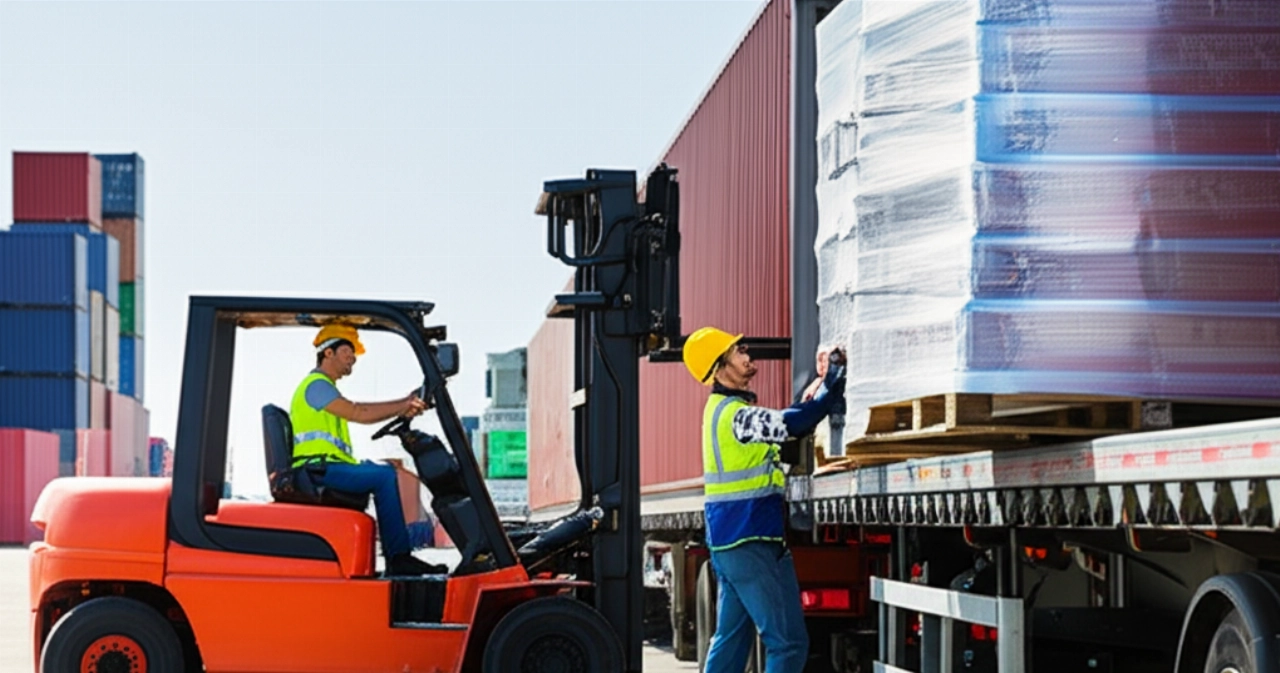Does international trade fascinate you, but bureaucracy and rules scare you? Have you ever heard of Incoterms® and immediately felt overwhelmed by their complexity? You are not alone. Understanding who pays for what, who is responsible for what, and where the seller's responsibility ends and the buyer's begins can seem like a maze with no exit.
Incoterms® 2020, while fundamental for any international shipment, are often seen as an obstacle, a source of anxiety and potential hidden costs. The fear of making mistakes that could lead to delays, legal disputes, or unforeseen expenses is a real concern for many, whether you are a company that exports regularly or an individual who needs to manage a purchase from abroad.
In this definitive guide, we won't just give you a cold list of acronyms. We will provide you with the key to deciphering Incoterms® 2020 explained clearly, transforming them from a source of worry into a powerful tool to optimize your international shipments. We will guide you step by step, with simple and practical language, to make you finally feel in control. Our goal is to give you the peace of mind of knowing that your goods travel protected and that your costs are under control. Let's begin your journey towards international shipments without surprises.

Beyond the Acronym: Why Understanding Incoterms® 2020 is Your Legal and Financial Armor
Incoterms® (International Commercial Terms) are not just acronyms to memorize. They are the universal language of international trade, a set of standardized rules published by the International Chamber of Commerce (ICC) that define the responsibilities of sellers and buyers for the delivery of goods sold under international sales contracts.
Understanding Incoterms® 2020 explained in depth means:
- Avoiding Hidden Costs: You know exactly who pays for transport, insurance, customs duties, and other ancillary expenses. This eliminates unpleasant surprises and financial disputes.
- Managing Risk: They define the exact point at which the risk of loss or damage to the goods passes from the seller to the buyer. This is crucial for your peace of mind and for managing any insurance claims.
- Simplifying Bureaucracy: They clarify who is responsible for export and import customs formalities, reducing complexity and accelerating processes.
- Building Trust: A clear understanding and application of Incoterms® demonstrates professionalism and transparency, building stronger and more lasting business relationships.
It's not just about compliance, but about strategy. Choosing the right Incoterm® can significantly influence the final price of the goods, the competitiveness of your offer, and your exposure to risk. It's an investment in your security and operational efficiency.

Navigating the Clauses: A Simple Map for Each Incoterm® 2020
Incoterms® 2020 are divided into two main groups: those applicable to any mode of transport and those specific to sea and inland waterway transport. Let's summarize them to give you a clear vision of who does what.
Incoterms® for Any Mode of Transport:
- EXW (Ex Works):
- Seller: Makes the goods available at their premises (factory, warehouse). Minimum responsibility.
- Buyer: Bears all costs and risks from the moment the goods are picked up, including loading, transport, insurance, export/import customs clearance. Maximum responsibility.
- When to use it: When the seller wants minimum commitment. Not ideal for inexperienced buyers.
- FCA (Free Carrier):
- Seller: Delivers the goods to the carrier nominated by the buyer at an agreed place (e.g., seller's warehouse or terminal). Handles export customs clearance.
- Buyer: Assumes costs and risks from the moment of delivery to the carrier onwards.
- When to use it: Very versatile, suitable for all types of transport, including partial loads (groupage).
- CPT (Carriage Paid To):
- Seller: Pays for the carriage of the goods to the agreed destination. Risk passes to the buyer when the goods are delivered to the first carrier.
- Buyer: Assumes risk from the moment of delivery to the first carrier. Pays for insurance and import customs clearance.
- When to use it: When the seller wants to manage the main transport, but the risk is the buyer's.
- CIP (Carriage and Insurance Paid To):
- Seller: Pays for carriage and insurance (minimum cover) to the agreed destination. Risk passes to the buyer when the goods are delivered to the first carrier.
- Buyer: Assumes risk from the moment of delivery to the first carrier. Pays for import customs clearance.
- When to use it: Similar to CPT, but with the addition of insurance at the seller's expense.
- DPU (Delivered at Place Unloaded):
- Seller: Delivers the goods unloaded at the agreed destination. Bears all costs and risks up to that point, including unloading.
- Buyer: Handles import customs clearance and any duties.
- When to use it: When the seller wants to manage the entire logistics up to unloading.
- DAP (Delivered at Place):
- Seller: Delivers the goods ready for unloading at the agreed destination. Bears all costs and risks up to that point, excluding unloading.
- Buyer: Handles unloading, import customs clearance, and any duties.
- When to use it: Very common, offers good protection to the buyer up to the point of delivery.
- DDP (Delivered Duty Paid):
- Seller: Delivers the goods cleared for import and ready for unloading at the agreed destination. Bears all costs and risks, including import duties and taxes. Maximum responsibility.
- Buyer: Minimum responsibility. Only needs to unload the goods.
- When to use it: Ideal for the buyer who wants to receive the goods "turnkey". Requires the seller to have good knowledge of the import regulations of the destination country.
Incoterms® for Sea and Inland Waterway Transport:
- FAS (Free Alongside Ship):
- Seller: Delivers the goods alongside the vessel at the named port of shipment. Handles export customs clearance.
- Buyer: Bears all costs and risks from the moment the goods are alongside the vessel.
- FOB (Free On Board):
- Seller: Delivers the goods on board the vessel at the named port of shipment. Handles export customs clearance.
- Buyer: Bears all costs and risks from the moment the goods are on board the vessel.
- When to use it: Very common for sea transport of containers and bulk cargo.
- CFR (Cost and Freight):
- Seller: Pays the costs and freight to bring the goods to the named port of destination. Risk passes to the buyer when the goods are on board the vessel at the port of shipment.
- Buyer: Assumes risk from the moment of loading. Pays for insurance and import customs clearance.
- CIF (Cost Insurance and Freight):
- Seller: Pays the costs, insurance (minimum cover), and freight to bring the goods to the named port of destination. Risk passes to the buyer when the goods are on board the vessel at the port of shipment.
- Buyer: Assumes risk from the moment of loading. Pays for import customs clearance.
- When to use it: Widely used, similar to CFR but with insurance at the seller's expense.
This map offers you an an essential overview. The key is to choose the Incoterm® that best suits your commercial strategy, your risk tolerance, and your ability to manage logistics.

Hidden Traps: Common Mistakes and How to Avoid Them with Incoterms® 2020
Even with Incoterms® 2020 explained, mistakes are around the corner. A misinterpretation or a superficial choice can turn a promising deal into a logistical and financial nightmare. Here are the most common traps and how to avoid them:
- Mistake 1: Not Specifying the Incoterms® Version.
The Trap: Simply using "FOB" without specifying "FOB Incoterms® 2020". If you don't indicate the version, you might be referring to previous rules (e.g., 2010, 2000), which could have significant differences and create ambiguity in case of dispute.
The Antidote: Always specify the version: "FOB Shanghai, Incoterms® 2020". This eliminates any doubt about the basis of the rules applied.
- Mistake 2: Choosing the Wrong Incoterm® for the Type of Transport.
The Trap: Using maritime Incoterms® (FOB, CIF, CFR, FAS) for multimodal shipments (e.g., truck + air). This is a frequent error that can lead to inconsistencies in risk and responsibility management, especially when the goods are not loaded directly onto a vessel.
The Antidote: For multimodal transport (air, road, rail, intermodal), always use Incoterms® from the "Any Mode of Transport" group (EXW, FCA, CPT, CIP, DPU, DAP, DDP). If your goods travel in containers, even by sea, FCA is often more appropriate than FOB, as control of the goods passes to the carrier at the terminal, not on board the vessel.
- Mistake 3: Not Defining the Exact Place of Delivery.
The Trap: Only indicating "DAP Milan" without specifying the exact address. This can lead to confusion about the precise point where risk and costs pass, especially in large cities or areas with access restrictions (ZTL - Limited Traffic Zones).
The Antidote: Always be extremely precise: "DAP Via Roma 123, 20121 Milan, Italy, Incoterms® 2020". This eliminates any ambiguity and ensures everyone is aligned on the delivery point.
- Mistake 4: Underestimating Insurance.
The Trap: Thinking that Incoterms® automatically cover full insurance. Only CIP and CIF require the seller to arrange insurance, and this is often minimum cover (Clause C). For other Incoterms®, insurance is at the discretion of the parties.
The Antidote: Regardless of the Incoterm® chosen, always evaluate the opportunity to take out an "All Risks" insurance for your goods. The bill of lading or the consignment note (CMR) are not insurance policies. The peace of mind of knowing that your goods are protected from damage or loss is worth the investment.
These mistakes can be costly. Our experience teaches us that prevention is the best strategy. Rely on those who deeply understand these dynamics to avoid unpleasant surprises.
Not Just Rules, but Strategy: How TrasportoMerci.net Guides You in Choosing the Perfect Incoterm®
Understanding Incoterms® 2020 explained is the first step. The second, and most crucial, is applying them correctly to your specific shipping needs. This is where TrasportoMerci.net stands out, not just as a carrier, but as your strategic logistics partner.
Our mission is not only to transport your goods but to ensure that every shipment is managed with maximum safety, transparency, and efficiency. Whether you are a company managing high volumes or an individual with an occasional but valuable shipment, choosing the right Incoterm® is fundamental for the success of your operation.
Our method is based on:
- Personalized Consultation: We don't leave you alone to decipher acronyms. We analyze your specific needs (type of goods, destination, urgency, budget) and advise you on the most advantageous Incoterm® for you, explaining the pros and cons.
- Total Cost Transparency: Thanks to the correct application of Incoterms®, our quotes are clear and detailed, with no hidden costs. You know exactly what you are paying for and why.
- Integrated Risk Management: We help you understand the points of risk transfer and offer adequate insurance solutions to protect your investment.
- Bureaucratic Expertise: Managing customs clearance, duties, and other customs formalities can be a maze. We guide you through every step, ensuring compliance and fluidity.
We are the bridge of trust that allows you to navigate the complexity of international trade with peace of mind. Your goods, whether an industrial machinery, a grand piano, or a stock of products for your e-commerce, are in expert hands.
Frequently Asked Questions about Incoterms® 2020 Explained
- Which Incoterm® is safest for the buyer?
- The most advantageous and safest Incoterm® for the buyer is generally DDP (Delivered Duty Paid). With DDP, the seller assumes almost all costs and risks, including transport, insurance, export and import customs clearance, and the payment of duties and taxes, until the goods are delivered to the agreed destination.
- Which Incoterm® is most convenient for the seller?
- The Incoterm® that offers the minimum responsibility and lowest cost for the seller is EXW (Ex Works). The seller merely makes the goods available at their premises, and the buyer assumes all costs and risks from pickup onwards.
- Do Incoterms® apply to every type of transport?
- No, not all of them. Incoterms® are divided into two groups: those applicable to any mode of transport (EXW, FCA, CPT, CIP, DPU, DAP, DDP) and those specific to sea and inland waterway transport (FAS, FOB, CFR, CIF). It is crucial to choose the correct Incoterm® based on the type of shipment to avoid problems.
- What happens if we don't specify an Incoterm®?
- Not specifying an Incoterm® in an international sales contract can lead to serious disputes and misunderstandings between seller and buyer. Without a clear definition of responsibilities, costs, and risk transfer, any problem (damage, delays, unexpected customs costs) can turn into a legal dispute, resulting in losses of time and money.
- Do Incoterms® cover cargo insurance?
- Only two Incoterms® (CIP and CIF) require the seller to arrange insurance for the goods. However, this insurance is often minimum cover (Clause C). For all other Incoterms®, insurance is not an obligation of the seller. It is always strongly recommended that the party bearing the risk takes out an "All Risks" insurance to protect the value of the goods throughout the entire journey.
Now you know exactly what to look for when choosing an international transport service that guarantees safety and transparency, without anxiety or surprises. You have understood the crucial role of Incoterms® 2020 explained and how they can influence your peace of mind and your budget.
Perhaps you think mastering Incoterms® is a task for legal experts or that a professional consulting service is too expensive or complicated to arrange. In reality, the biggest cost is the uncertainty and the risk of errors that can jeopardize an entire deal. A reliable partner saves you time, money, and stress, transforming complexity into a competitive advantage.
Don't let uncertainty about shipping terms hinder your business or expose you to unnecessary risks. Your goods deserve a smooth journey, and you deserve the peace of mind of knowing that every detail is under control. The first step towards impeccable international shipments is a personalized consultation on your specific transport needs.
Stop wasting time comparing incomprehensible quotes. Click here, describe what you need to ship, and receive a clear, detailed, and no-obligation quote, based on the Incoterm® most suitable for you. Discover now the best solution for your international shipments and transform complexity into a competitive advantage.